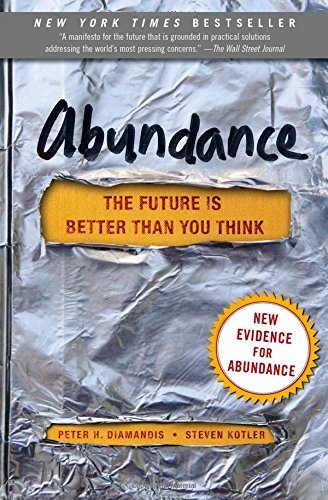
The New York Times bestselling “manifesto for the future that is grounded in practical solutions addressing the world’s most pressing concerns: overpopulation, food, water, energy, education, health care and freedom” (The Wall Street Journal).
Since the dawn of humanity, a privileged few have lived in stark contrast to the hardscrabble majority. Conventional wisdom says this gap cannot be closed. But it is closing—fast.
In Abundance, space entrepreneur turned innovation pioneer Peter H. Diamandis and award-winning science writer Steven Kotler document how progress in artificial intelligence, robotics, digital manufacturing synthetic biology, and other exponentially growing technologies will enable us to make greater gains in the next two decades than we have in the previous 200 years. We will soon have the ability to meet and exceed the basic needs of every person on the planet. Abundance for all is within our grasp.
Breaking down human needs by category—water, food, energy, healthcare, education, freedom—Diamandis and Kotler introduce us to innovators and industry captains making tremendous strides in each area. “Not only is Abundance a riveting page-turner…but it’s a book that gives us a future worth fighting for. And even more than that, it shows us our place in that fight” (The Christian Science Monitor).

An Important “Post-Scarcity” Perspective “Abundance” is a deeply optimistic book that suggests radical new technologies may soon transform society and lead to an era where the concept of scarcity no longer dominates economic and social thinking. The authors believe that advances now on the horizon could potentially solve many of the world’s major problems by the year 2035.The book includes a wealth of material on specific technologies that the authors feel may revolutionize energy (solar, algae-based biofuels and next…
A Brief Summary and Review *A full summary of this book is available here: In their new book `Abundance: The Future Is Better Than You Think’, Peter Diamandis and Steven Kotler argue that, despite the problems that our technology has recently created (including dwindling resources, global warming, and a population explosion that…